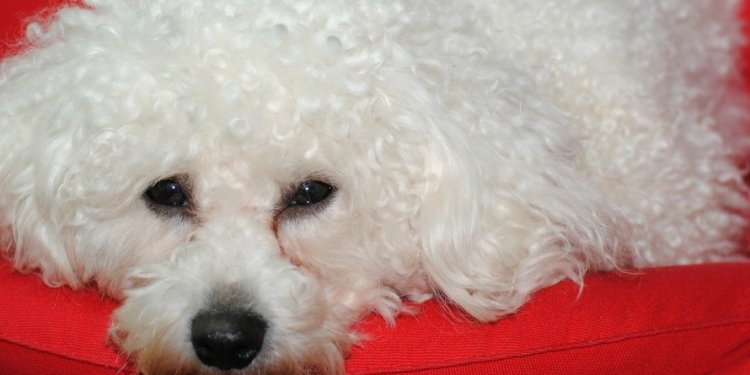
Bichon Frise dogs
 The AKC Standard calls the Bichon Frise "a white powder puff of a dog whose merry temperament is evidenced by his plumed tail carried jauntily over the back and his dark-eyed inquisitive expression."
The AKC Standard calls the Bichon Frise "a white powder puff of a dog whose merry temperament is evidenced by his plumed tail carried jauntily over the back and his dark-eyed inquisitive expression."
The Bichon Frise is easy to live with, a cheerful, pleasant house dog who enjoys playing games, snuggling into laps and pillows, and perching on the back of the sofa so he can peer out the window.
Exercise needs are easy to meet: a daily walk or two, plus a small yard in which to trot around and stretch his legs.
Bichons are peaceful with everyone, including other pets. There is timidity in some lines, so early socialization is important to develop their confidence.
Though he does have an independent streak, the Bichon Frise is not a dominant dog and responds well to nonforceful training. He prefers learning tricks to formal obedience and is especially bright-eyed when food treats are offered as rewards. Harshness only makes him spiteful.
The three most common behavioral issues with the Bichon Frise are: 1) housebreaking: Bichons are usually difficult to housebreak; 2) separation anxiety: most Bichons are so sociable and dependent on human companionship that they don't do well when left for long periods of time; and 3) some Bichons are barky - and some have a high-pitched bark that can set your teeth on edge.
- Is small but sturdy
- Is playful, but doesn't need much outdoor exercise (though he enjoys it!)
- Has a curly coat that doesn't shed (one of the best breeds for allergy sufferers)
- Makes an alert watchdog, but is not aggressive
- Is good with other pets
A Bichon Frise may be right for you.
- Notorious housebreaking difficulties
- "Separation anxiety" (destructiveness and barking) when left alone too much
- Shyness in some lines, or when not socialized enough
- Frequent clipping of the curly coat
- Potential for excessive barking
A Bichon Frise may not be right for you.
If I was considering a Bichon Frise, I would be most concerned about...
- Grooming. To keep their coat free of mats, Bichons require regular brushing and combing, and also clipping and trimming every 6 weeks. Just don't expect your pet Bichon Frise to look like the "puff-ball" Bichon Frise show dogs you've probably seen on the Westiminster Kennel Club show on TV. That particular look takes hours of work by experienced show groomers and then they can never let the dog out in the yard to play. You don't want that! Instead, just clip your Bichon's coat short so that brushing and combing is minimized – an additional benefit is that he will look like an adorable puppy throughout his life.
- Housebreaking. As a behavioral consultant, I put the Bichon Frise on my Top 10 List of "Hard to Housebreak." Consistent crate training is mandatory. Sometimes a doggy door is necessary, and it should lead out to a COVERED potty yard, as Bichons often won't go out in the rain. Housebreaking issues are a major reason why Bichons are turned over to rescue organizations. Read more on housebreaking your Bichon Frise.
- Finding a healthy one and keeping him healthy. Many Bichons live a good long life, but unfortunately they are very prone to scratching and chewing themselves into horrendous skin conditions. They are often allergic to fleas, chemicals, grass, pollen, and so on. Urinary problems and bladder stones are another concern in the breed, along with loose knee joints, ear infections, cataracts, diabetes, heart disease, and more. To avoid these problems, you need to buy your Bichon Frise from the right breeder. And once you have your puppy home, you need to keep him healthy, starting with feeding the best foods.
- Separation anxiety. More than most other breeds, the Bichon Frise needs a great deal of companionship and does not like being left alone for more than a few hours. They tend to express their unhappiness through destructive chewing and barking.
- Barking. Like most small dogs, the Bichon Frise is often too quick to sound the alarm at every new sight and sound. You have to be equally quick to stop your Bichon from turning into a barker. To do this successfully...
You must teach your Bichon to respect you. A dog who respects you will do what you say and will stop what he's doing when you tell him "No."
My book Teach Your Dog 100 English Words, gives you a unique vocabulary to use with your dog AND teaches my Respect Training Program. Your dog will look at you when you speak and do what you say. Not just when he's hungry for a treat or feels like it. But all the time. Because he respects you.
MORE OF MY ARTICLES YOU MIGHT ENJOY.
Copyright © 2000-2016 by Michele Welton. All rights reserved.
No part of this website may be copied, displayed on another website,

















